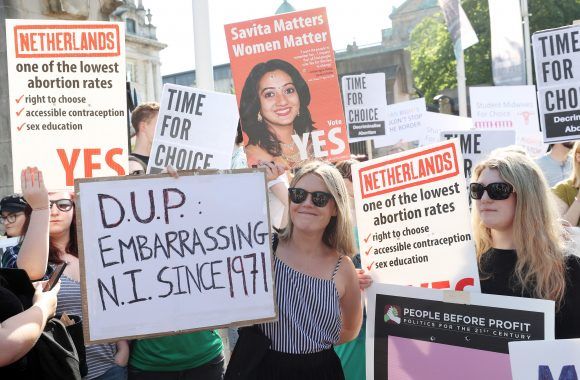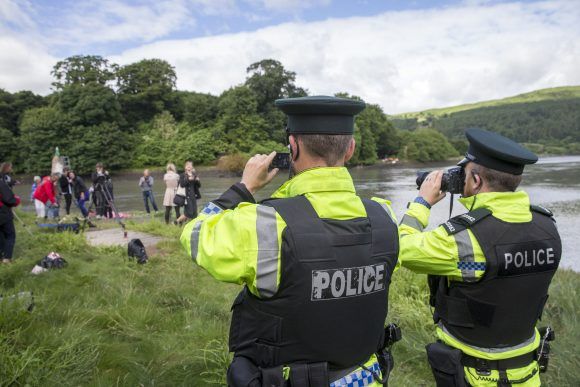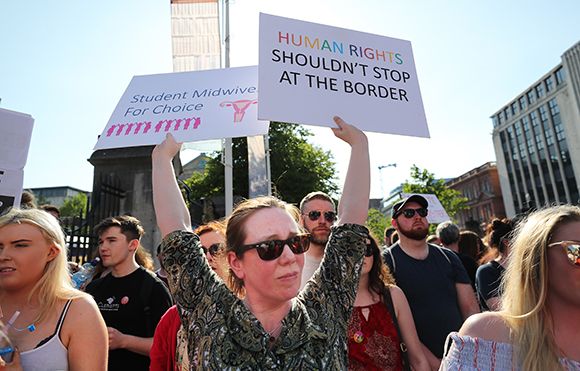
The landslide result of the referendum to repeal the 8th Amendment in the Republic of Ireland has brought long-overdue attention to the UK’s blind spot for reproductive rights: Northern Ireland.
50 years after its enactment in Great Britain, the 1967 Abortion Act does not apply in Northern Ireland and abortion is only permitted there in circumstances where it is necessary to preserve the life of the pregnant person.
The essence of the problem is twofold. First, politicians at Stormont and Westminster have gravely neglected the human rights of people in Northern Ireland by refusing to legislate for access to abortion services there, and allowing people who self-induce abortions via imported pills to be criminalised under the 1861 Offences Against the Person Act.
Second, feminist activists and left-wing campaigners in Great Britain have ultimately failed over the course of the last 50 years to offer genuine and consistent solidarity to Northern Irish pro-choice activists in the fight for reform.
It is long past time for politicians and allies to change their approach and support abortion reform in earnest.
A human rights issue
International human rights bodies routinely criticise the complicity of the UK government in the denial of abortion rights in Northern Ireland to little effect.A February 2018 report by the UN Committee on the Elimination of Discrimination Against Women (CEDAW) states that the status quo in Northern Ireland demonstrates “grave and systemic” breaches of the human rights of pregnant people by the UK government. Yet, like its Labour and Conservative predecessors since 1967, Theresa May’s government continues to use devolution as a shield against calls for abortion reform.
Following the Irish referendum result, May has once again rejected the idea of MPs legislating from Westminster. The Secretary of State for Northern Ireland, Karen Bradley, made it clear in recent weeks that the option for Westminster to intervene to ensure legal access to abortion there is firmly off the table.

The disparity in access to abortion within the UK is more than an unfortunate consequence of devolution. In the absence of a functioning devolved legislature, there is no way to enact abortion reform in Northern Ireland without intervention from Westminster.
Yet MPs who claim that this issue only reveals the urgency of restoring that legislature are being disingenuous. The fact is, abortion law in Northern Ireland is likely to remain restrictive for decades without intervention from Westminster, even if devolution is restored at Stormont after 16 months’ suspension.
The multi-layered and unresolved issues of post-conflict society mean that the Northern Irish electorate largely votes based on community affiliation and the constitutional question, rather than their views on particular social issues. The four largest political parties (DUP, Sinn Féin, SDLP and UUP) have little incentive to actively support a liberalisation of abortion law—invoking issues and messaging which appeal specifically to either an ‘orange’ or ‘green’ (i.e. a Protestant/Unionist/Loyalist or Catholic/Nationalist/Republican) demographic is guaranteed to win far more votes.
CEDAW has noted that while abortion is devolved to the Health and Justice ministries in Northern Ireland, human rights duties are not devolved. Therefore the UK government, as the state party for human rights treaties, is ultimately responsible for vindicating the human rights currently breached under Northern Ireland’s abortion law. Devolution is not a shield.
A long history of inequality
Some in London are beginning to realise this. In June 2017, the threat of an amendment to the Queen’s Speech proposed by Walthamstow MP Stella Creasy forced the government to address the decades-long injustice of people from Northern Ireland, whose taxes contribute to the NHS, being denied free treatment when they travelled to Great Britain to access NHS abortion services.It is deeply shameful that only in 2017 did the UK government act to mitigate this financial burden. More damning still is the fact this decision was a direct contrast to the then Health Secretary Jeremy Hunt’s evidence before the Supreme Court a few months earlier, which argued that the 49-year exclusion of NI residents from NHS funding was justified out of respect for the democratic process in Northern Ireland.
Since news of the Republic’s referendum result, similar sentiments have re-appeared in the press. Suggestions of a referendum on abortion reform in Northern Ireland are borne out of political cowardice. The Republic of Ireland had to hold a referendum to enact abortion reform because its abortion ban was codified in a constitution which mandates referenda; the abortion law in Northern Ireland can be reformed through the normal legislative process at Stormont or Westminster.
As things stand, the funding of NHS abortions is a much-needed sticking plaster on a gaping wound: free, safe, legal and local abortion services must be introduced in Northern Ireland as soon as possible. However, the confidence and supply relationship between Theresa May’s government and the DUP at Westminster means that the chance of passing any abortion reform in a similar way via Westminster appears very small at present.

Neglect across the floor
This is not just a case of regressive right-wing parties failing to legislate for reproductive rights.It is worth remembering that in 2008, the Labour government reneged on its plan to extend abortion rights to Northern Ireland through an amendment to the Human Fertilisation and Embryology Bill.
In a disgraceful move apparently taken to secure DUP votes on its 42-day terrorism detention bill, Labour dropped its previous commitment to bring abortion reform for Northern Ireland. This move allowed the status quo to persist for a further decade.
The post-referendum proposals to table an amendment to the upcoming domestic violence bill to enact abortion reform in Northern Ireland via Westminster must be followed through. A repetition of the failure of 2008 would be cruel to pro-choice activists and the people who have had to travel for abortion, often at great financial and emotional cost, or risk prosecution by inducing abortion with pills bought online.
On-the-ground activism
The central role of grassroots activism in the repeal the 8th Amendment in the Republic of Ireland has shown that on the island of Ireland, abortion reform efforts come from below and politicians trail behind until the cost of inaction outweighs the risk of taking a stand.Pro-choice activists in Northern Ireland have pushed abortion reform onto the agenda in spite of a largely apathetic media which has, until now, taken its cues from anti-choice politicians rather than the growing body of opinion polls demonstrating support for reform.
We have persisted in advocating for our bodily autonomy while mainstream feminism in Great Britain tossed us a few sympathetic articles, and went back to debating whether or not trans women should be able to access basic rights and key services.

Feminist scholar Sara Ahmed notes that “solidarity requires commitment and work.” The time for that commitment and work to materialise from feminists and the left in Great Britain is now. Writing occasional articles and supportive tweets is not enough: those who wish to show support for abortion reform in Northern Ireland should take their cues from the recommendations of international human rights bodies and activists on the ground, including Alliance for Choice.
We do not need a referendum on abortion in Northern Ireland. We need politicians to critically assess the fact that by refusing to use the powers they already possess to legislate for reform, they are perpetuating a cruel form of NIMBYism whereby three people a day must travel or risk prosecution using abortion pills bought online. We need allies in Great Britain to listen to activists and support our calls for the decriminalisation of abortion in Northern Ireland rather than the extension of the out-of-date provisions of the 1967 Abortion Act, which only allows legal abortion in specific restricted circumstances.
We need feminists in Great Britain to actively fight with us against this 50-year long injustice and challenge and protest it as much as they would if it were happening in Manchester. Just like our fellow activists in the Republic of Ireland, pro-choice campaigners in Northern Ireland will force this issue onto the political stage regardless of how long it takes for the political establishment to do the right thing and bring abortion reform. Reproductive justice delayed is reproductive justice denied: now is the time for change.












